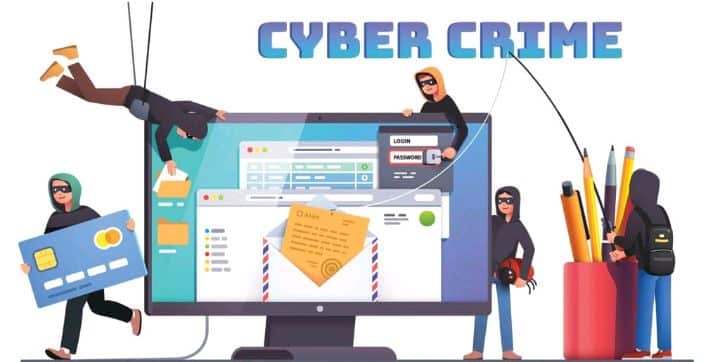In today’s digital age, where connectivity and technology permeate almost every aspect of daily life, cybercrime has emerged as one of the most pressing challenges society faces. The rise of the internet and digital technologies has revolutionized communication, commerce, and information sharing but has also opened the door to sophisticated criminal activities carried out via the cyber realm. This article explores the multifaceted impacts of cybercrime on society, focusing on economic repercussions, effects on personal safety, implications for privacy, and the responses from law enforcement and governments.

1. Economic Repercussions.
Financial Losses to Individuals and Businesses One of the most immediate impacts of cybercrime is the financial burden it places on individuals and organizations. Reports indicate that cybercrime costs the global economy billions of dollars each year. From identity theft to data breaches, individuals may find themselves financially devastated after falling victim to cybercriminals.
The Cost of Data Breaches Businesses are particularly susceptible to significant financial losses caused by data breaches. Cyber criminals often target sensitive personal and financial information stored by companies. According to industry reports, the cost of a data breach can extend beyond initial theft, incurring expenses related to legal fees, regulatory fines, reputational damage, and loss of customer trust. This, in turn, can lead to reduced sales and share prices, making cybercrime a pressing concern for corporate entities.
Cybercrime and Small Businesses Small to medium-sized enterprises (SMEs) are not exempt from cyber threats; they are, in fact, often targeted precisely because of their perceived lack of robust cyber security measures. A successful cyber attack on a small business can lead to closure due to financial strain, lost customers, and the high cost of recovery efforts. Cybercrime disproportionately affects SMEs, jeopardizing livelihoods and exacerbating economic inequality.

2. Effects on Personal Safety
Threats to Personal Security the pervasive nature of cybercrime raises significant concerns regarding personal safety. Cyber criminals can easily exploit vulnerabilities in online platforms, subsequently endangering individuals’ safety. This includes not only financial scams but also forms of harassment and stalking through digital platforms.
Cyber bullying and Online Harassment Cyber Bullying has escalated alongside the growth of social media platforms, with children and adolescents becoming prime targets. The impacts of cyber bullying may extend well beyond the virtual realm, leading to emotional distress, mental health issues, and even physical harm. The anonymity provided by the internet often emboldens perpetrators, complicating efforts to combat this pervasive problem and posing serious challenges for victims seeking redress.
The Rise of Digital Predators Cybercrime also enables the exploitation of vulnerable individuals through online predators. Children, in particular, face risks that necessitate heightened awareness and protections. Grooming, solicitation, and trafficking have become increasingly facilitated through digital channels, necessitating concentrated efforts from parents, educators, and law enforcement to protect young people from online dangers.
3. Implications for Privacy
Erosion of Personal Privacy The surge in cybercrime has fostered a corresponding erosion of privacy. Individuals routinely share significant amounts of personal information online, leading to vulnerabilities that cyber criminals can exploit. Data breaches, such as those from social media platforms and online services, reveal sensitive information that can be used maliciously.
Surveillance and Data Collection In efforts to mitigate cybercrime, some governments have adopted surveillance measures that raise significant privacy concerns. Legislative actions intended to enhance cyber security may inadvertently lead to excessive monitoring of citizens, challenging the balance between security and individual rights. Privacy concerns underscore the ethical dilemmas involved in combating cybercrime while preserving civil liberties.Identity Theft and Its Consequences Identity theft is one of the most prevalent forms of cybercrime, with profound implications for victims. When individuals’ personal information is stolen, it can result in unauthorized financial transactions, damage to credit ratings, and long and arduous processes to regain one’s identity. The emotional toll, combined with the practical implications of financial instability, can create lasting distress for victims.

4. Responses from Law Enforcement and Governments.
Law Enforcement Challenges As cybercrime continues to evolve, law enforcement agencies face challenges in addressing and preventing these offenses. Cyber criminals often operate across borders, complicating jurisdictional issues and the prosecution of offenders. Furthermore, the rapid pace of technological innovation means law enforcement must continually adapt their strategies and tools to keep pace with increasingly sophisticated cyber threats.
Collaboration and Partnerships To combat cybercrime effectively, law enforcement agencies are increasingly collaborating with private companies, non-profit organizations, and the international community. Partnerships facilitate information sharing, joint investigations, and collective responses to cyber threats. Organizations such as the FBI and INTERPOL play important roles in coordinating and leading these collaborative efforts on a global scale.
Legislative Responses and Cyber Security initiatives governments worldwide are enacting legislative measures and policy initiatives to counter the cybercrime threat. These may include laws that specifically target cyber offenses, strategies to improve national cyber security infrastructure, and funding for research and development of security technologies. Developing public awareness campaigns is also essential, educating citizens about safe online practices and how to respond to potential cyber threats.
Conclusion
The impact of cybercrime on society is profound and multifaceted, affecting individuals, organizations, and economies on a global scale. As technology continues to advance and the digital landscape expands, the threat of cybercrime remains ever-present. Addressing these challenges requires a concerted effort that includes enhancing cyber security, fostering public awareness, and promoting collaboration between law enforcement and the private sector.Ultimately, as society grapples with the complexities of cybercrime, the need for vigilance, proactive measures, and robust policies has never been more critical. By embracing a comprehensive approach to combat cyber threats, we can work toward a safer digital environment that protects the rights, privacy, and security of all individuals. The journey is ongoing, but with each step taken, we pave the way for a more secure future.




